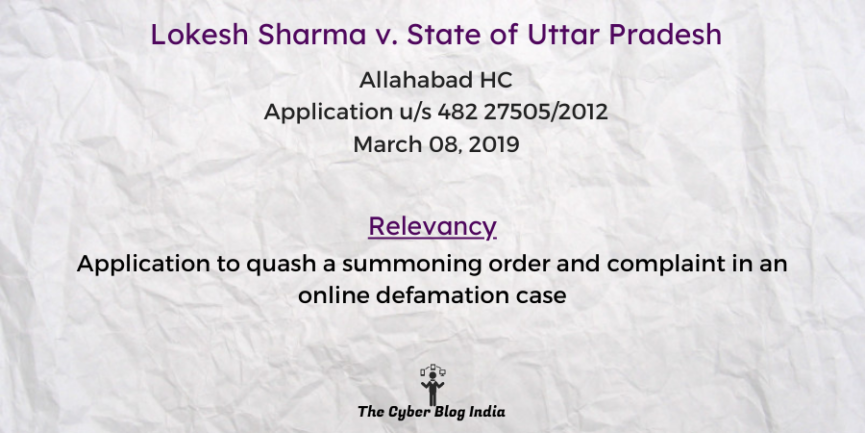Lokesh Sharma v. State of Uttar Pradesh

Lokesh Sharma v. State of Uttar Pradesh
In the High Court of Allahabad
Application u/s 482 27505/2012
Before Justice Saumitra Dayal Singh
Decided on March 08, 2019
Relevancy of the case: Application to quash a summoning order and complaint in an online defamation case
Statutes and Provisions Involved
- The Code of Criminal Procedure, 1973 (Sections 200, 202, 482)
- The Indian Penal Code, 1860 (Sections 499, 500)
- The Information Technology Act, 2000 (Section 66)
Relevant Facts of the Case
- The second applicant’s spoilt marital relations with the complainant’s son had caused acrimony, and the second applicant had filed several criminal complaints against him in the past.
- The complainant alleged that the second applicant conspired with the police to have the complainant and his family members arrested. The applicants circulated the news and photographs of their arrest and made obscene allegations about the complainant’s wife and his son.
- The Magistrate passed a summoning order upon satisfaction on the prima facie liability of the accused applicants in Narendra Kumar Saraswat v. Anand Prakash.
Prominent Arguments by the Advocates
- The applicants’ counsel argued that:
- The complaint against the applicants was vague and did not disclose vital particulars. The Magistrate failed to make the necessary inquiries before passing the summoning order.
- The allegations did not fulfil the ingredients of defamation since the conduct was protected by the exceptions under Section 499 of the Indian Penal Code, 1860.
- The complainant implicated the relatives of the second applicant to harass her.
- The applicants resided in a region outside the Magistrate’s jurisdiction. Therefore, he should have ensured strict fulfilment of the requirements under Section 202 of the Code of Criminal Procedure, 1973, which were absent in the instant case.
- The complainant’s counsel submitted that:
- The Supreme Court’s decisions suggested that the exact words constituting the offence did not have to be specified to constitute an offence under Section 499.
- The examination of the conduct being an exception to this offence was a matter of trial.
- The powers of the court should be exercised sparingly.
Opinion of the Bench
- The complainant failed to disclose material details of the alleged defamatory conduct and publication and failed to fulfil the minimum disclosure requirement.
- Without such disclosure, the applicants’ conduct did not fulfil the ingredients of defamation.
- The threshold of inquiry under Section 202 was higher since the complainants had been residing outside the jurisdiction of the Magistrate, and the same was not satisfied.
Final Decision
- The court allowed the applications and quashed the summoning order along with the complaint.
Jyotsna Sood, an undergraduate student at the National Law Institute University, Bhopal, prepared this case summary during her internship with The Cyber Blog India in May/June 2024.
